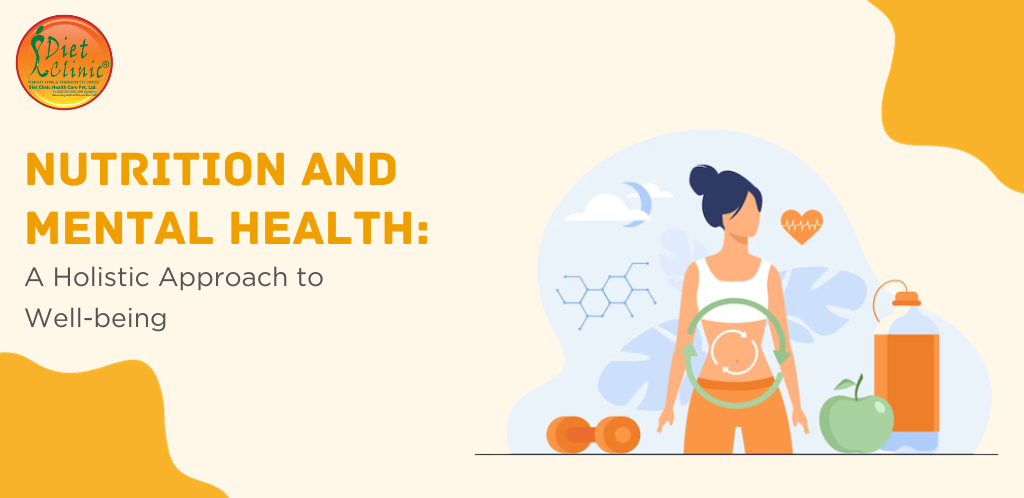
Dietician Sheela Seharawat
Nutrition and Mental Health: A Holistic Approach to Well-being
In our fast-paced world, the importance of holistic well-being is gaining recognition. We often hear about the significance of physical health, exercise, and a balanced diet. But what about mental health? It's an integral part of our overall well-being, and its connection to nutrition is profound.
As a dietician, I firmly believe that a holistic approach to well-being should encompass both physical and mental health. In this blog, we will delve into the intricate relationship between nutrition and mental health and discover how making mindful dietary choices can have a significant impact on our emotional and psychological well-being.
The Mind-Body Connection:
The mind and body are intricately connected, and this connection is exemplified through nutrition. What we eat not only fuels our body but also affects our mood, cognitive function, and emotional state. To understand this connection better, let's explore some of the key ways nutrition influences mental health.
1. Nutrients for Brain Health:
Our brain requires an array of nutrients to function optimally. Nutrients like omega-3 fatty acids, vitamins, minerals, and antioxidants play crucial roles in brain health. For instance, omega-3s found in fatty fish, flaxseeds, and walnuts have been associated with improved mood and reduced risk of depression.
Similarly, vitamin D, often referred to as the "sunshine vitamin," is essential for mental well-being. A deficiency in vitamin D has been linked to depression and other mood disorders. Ensure you get enough sunlight or consider vitamin D supplements if necessary.
2. The Gut-Brain Axis:
There's a fascinating connection between our gut and brain known as the gut-brain axis. The gut is home to trillions of bacteria, collectively known as the gut microbiota. These bacteria play a crucial role in maintaining our mental health.
A healthy gut microbiota is associated with reduced symptoms of depression and anxiety. To promote a balanced gut microbiota, consume a diet rich in fiber from fruits, vegetables, and whole grains. Additionally, incorporate probiotic-rich foods like yogurt, kefir, and sauerkraut into your diet.
3. Blood Sugar and Mood:
The foods we eat have a direct impact on our blood sugar levels. Consuming high-sugar foods and refined carbohydrates can lead to rapid spikes and crashes in blood sugar, resulting in mood swings and irritability. Stable blood sugar levels are essential for maintaining a balanced mood and energy throughout the day.
To keep your blood sugar steady, opt for complex carbohydrates like whole grains, legumes, and vegetables. Pair them with sources of protein and healthy fats for sustained energy and mood stability.
4. Inflammation and Mental Health:
Chronic inflammation in the body has been linked to various mental health conditions, including depression and anxiety. The foods we eat can either promote or reduce inflammation.
Anti-inflammatory foods like fatty fish, nuts, seeds, and colorful fruits and vegetables are rich in antioxidants and compounds that can help combat inflammation. On the other hand, a diet high in processed foods, trans fats, and sugary beverages can promote inflammation and negatively impact mental health.
5. Micronutrients and Mood:
Micronutrients, including vitamins and minerals, are essential for maintaining mental health. Deficiencies in certain micronutrients can lead to mood disorders. For example, low levels of B vitamins, particularly folate and B12, have been associated with an increased risk of depression.
To ensure you're getting an adequate intake of micronutrients, consume a diverse and balanced diet that includes a variety of fruits, vegetables, lean proteins, and whole grains.
Practical Tips for a Holistic Approach:
Now that we've established the connection between nutrition and mental health, here are some practical tips to help you adopt a holistic approach to well-being:
1. Prioritize a Balanced Diet:
Make whole, unprocessed foods the foundation of your diet. Incorporate a variety of fruits, vegetables, lean proteins, whole grains, and healthy fats into your meals. This provides your body and brain with the nutrients they need for optimal function.
2. Stay Hydrated:
Dehydration can lead to mood swings and cognitive decline. Ensure you're drinking enough water throughout the day to stay hydrated and support your mental well-being.
3. Minimize Sugar and Processed Foods:
Limit your intake of sugary snacks, processed foods, and trans fats. These can contribute to inflammation and disrupt your mood stability.
4. Practice Mindful Eating:
Mindful eating involves paying attention to your body's hunger and fullness cues. It helps prevent emotional eating and promotes a healthier relationship with food.
5. Incorporate Omega-3s:
Include sources of omega-3 fatty acids in your diet, such as salmon, mackerel, chia seeds, and walnuts, to support brain health.
6. Manage Stress:
Chronic stress can take a toll on your mental health. Practice stress-management techniques such as meditation, deep breathing, and yoga to reduce stress levels.
7. Seek Professional Guidance:
If you're struggling with mental health issues, don't hesitate to seek help from a mental health professional. They can provide guidance, therapy, and, if necessary, medication to support your well-being.
Nutrition and mental health are intrinsically linked, and adopting a holistic approach to well-being involves recognizing this connection. By making mindful dietary choices, prioritizing nutrient-rich foods, and nourishing both your body and mind, you can enhance your overall well-being. Remember that small changes in your diet can have a big impact on your mental health, so take proactive steps toward a healthier and happier you.










